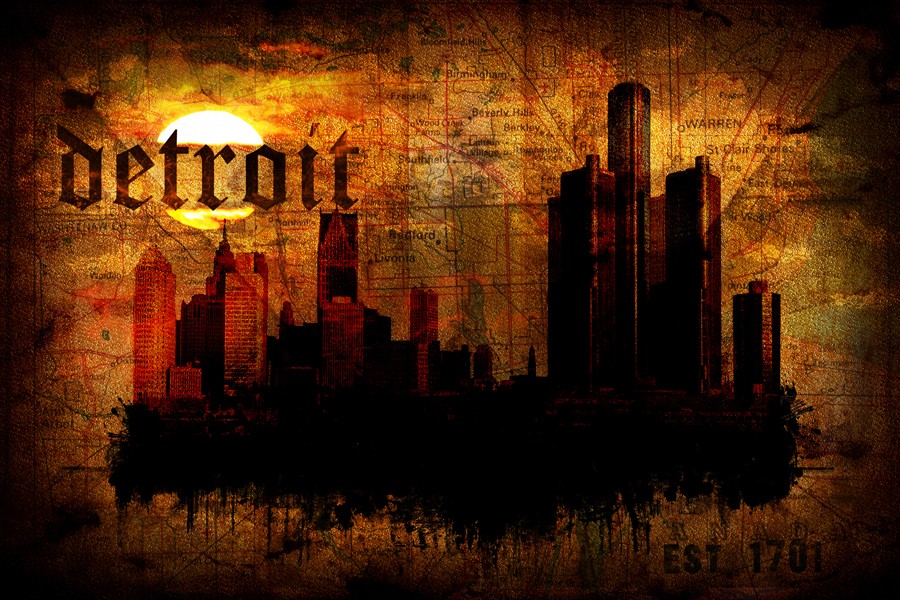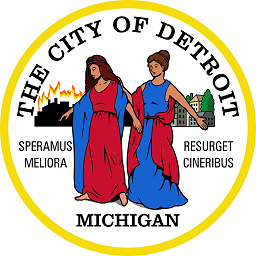Detroit
Quote

“Detroit is largely composed, today, of seemingly endless square miles of low-density failure.” -― Jane Jacobs, The Death and Life of Great American Cities
Appearance
City Device
Motto
Speramus Meliora; Resurget Cineribus -- (Latin: We Hope For Better Things; It Shall Rise From the Ashes)
Climate
Districts
Demonym
Economy
Geography
History
Beginnings
The first recorded mention of the site was in 1670, when French missionaries found a stone idol venerated by the Indians there and destroyed it with an axe. Early settlers planted twelve missionary pear trees "named for the twelve Apostles" on the grounds of what is now Waterworks Park.[4] French officer Antoine de la Mothe Cadillac founded Detroit in 1701 The Indians lost at the Siege of Fort Detroit during Pontiac's Rebellion in 1763. The American surrender, following the British Siege of Detroit during the War of 1812.
The city name comes from the Detroit River (French: le détroit du Lac Érie), meaning the strait of Lake Erie, linking Lake Huron and Lake Erie; in the historical context, the strait included Lake St. Clair and the St. Clair River.[5] The sieur de Cadillac in 1698 proposed to his government in Paris that Detroit be established as a shelter for displaced Indian allies. Paris approved and in 1701 Cadillac led a party of 100 Frenchmen to established a post called Fort Pontchartrain du Détroit, naming it after his sponsor the comte de Pontchartrain, Minister of Marine under Louis XIV. In 1704 he was given ownership over the strenuous opposition of officials in New France. An investigation by de Pontchartrain showed Cadillac was a tyrannical profiteer whose mischief hurt the French cause, so Cadillac was removed and sent to faraway New Orleans as governor of Louisiana.[6]
Ste. Anne de Détroit, founded 1701, is the second oldest continuously operating Catholic parish in the United States; it was the first building erected in Detroit.[1]
Grants of free land attracted families to Detroit, which grew to 800 people in 1765. The main business was trading furs with the Indians, using goods supplied from Montreal.[7] It was the largest French village between Montreal and New Orleans.[8] Francois Marie Picoté, sieur de Belestre (Montreal 1719–1793), the last French commander at Fort Detroit (1758–1760), surrendered on November 29, 1760 to the British. They shortened the name to Detroit. The City of Detroit (from Canada Shore), 1872, by A. C. Warren
Demonstrating their independent power, several tribes in the region collaborated in Pontiac's Rebellion in 1763; they overran many smaller forts but could not subdue Detroit.
Population
- -- City (688,701) - 2013 census
- -- Urban (3,734,090) - 2013 census
- -- Metro Area (4,292,060) - 2013 census
Arenas
Attractions
Bars and Clubs
Cemeteries
City Government
Crime
Citizens of the City
Current Events
Fortifications
Galleries
Holy Ground
Hospitals
Hotels & Hostels
Landmarks
Mass Media
Monuments
Museums
Parks
Private Residences
Restaurants
Ruins
Schools
Shopping
Telecommunications
Theaters
Detroit Masonic Temple
Transportation
The Sabbat
- -- <<Eastside Hoodoo Posse>> -- White gangsta wannabees
Websites
http://abigailanddolley.blogspot.com/2009/12/detroit-case-study-part-1.html
http://www.angelfire.com/de2/detroitpix/
http://www.detroitno2.com/v2/discussions/detroit-masonic-temple-from-grandeur-to-ghetto/
http://thereafterish.com/tag/theatre-bizarre/
http://www.inexpensive-vacation-ideas.com/Things-to-do-in-Detroit.html

